PYTHON DATA ANALYTICS BOOTCAMP
Start your new career in Data Analytics
PROGRAM BEGINS ON JUNE 13th
18 WEEKS TO YOUR NEW CAREER
Proven Student Success
Personal Coaching with Reuven Lerner
Learn Quickly As Part Of A Team
Powerful Training Exercises & Projects
Whether you want to jump-start a new career or improve your current one, you can’t go wrong with Python and Pandas. Companies need people familiar with these technologies to analyze their data, helping them to earn more and spend less.
Joining Reuven Lerner’s bootcamp means that you’ll have one of the world’s top Python trainers as your personal coach — giving you the right balance of structure, support, challenge, and collaboration that’ll help you to master Python, Git, and Pandas in four months.
Want to improve your career in the shortest possible time? Want the kind of personal attention that only a small class can offer? Want to join a bootcamp while keeping a full-time job? Want to join a course that you’ll actually complete?
The fifth cohort of Reuven’s Python Data Analytics Bootcamp starts on June 13th. Learn more about it below, then schedule a coaching call to see if it’s a good fit for you.
THE FASTEST WAY TO LEARN DATA ANALYTICS
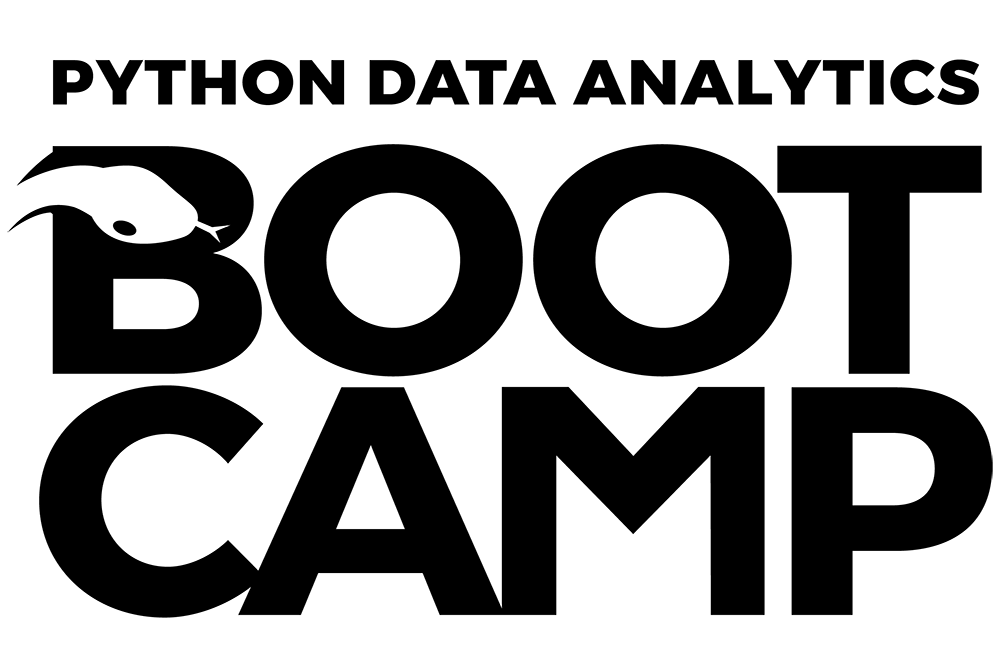
IN JUST 18 WEEKS YOU WILL BE ABLE TO...

Write idiomatic Python, using core data structures and custom functions

Understand and use object-oriented programming techniques to write maintainable code

Use Git and GitHub to collaborate with colleagues and participate in open-source projects

Use NumPy and Pandas to read, clean, analyze, and export real-world data, including date/time data

Create compelling visualizations with Matplotlib, Seaborn, and Pandas
MY STUDENTS LOVE THE BOOTCAMP
WHAT THE BOOTCAMP INCLUDES
1
All courses and resources for a full year
As a bootcamp student, you’ll have access to all of Reuven’s video courses, newsletters, exercises, office hours, and special lectures — not just during the bootcamp itself, but for the entire year of your subscription.
Want to go into greater depth on a topic during the bootcamp? Or take more advanced courses on a subject that we only touched on, once we’re done? Or perhaps you want to review a topic that we discussed, to really understand it.
The bootcamp is just the start of your Python learning; when you’re done, you’ll be able to improve and sharpen your skills further with many other resources.
2
A structured, proven syllabus to keep you on track
How often have you purchased an online course, only to let it sit, unwatched, on your computer? PythonDAB is designed to avoid that by combining video courses with twice-weekly live sessions. The goal is for you to not only watch the videos, but to participate in our live sessions — collaboratively solving problems, participating in special lectures, and getting personal, live feedback from Reuven.
The bootcamp even includes two “rest weeks” for you to catch up with material you might have missed. And if, for whatever reason, you don’t complete the bootcamp, or want to review the material? That’s fine — we run two cohorts each year, which means that your annual membership allows you to participate in it twice.
3
Live coaching sessions with Reuven
Previous bootcamp participants have said that the best part of the course was the twice-weekly live sessions with Reuven. Typically, one is a “collaboration session,” when we work together to solve exercises. The other session is typically an open Q&A opportunity, where we can review the material, go beyond it, or explore projects that bootcamp participants need help completing.
We have other opportunities for collaboration, as well: We share code (and critique each other’s solutions) in a private forum. We use GitHub to collaborate on projects, to learn how to use it effectively in the workplace. And Reuven gives some special lectures as well, to supplement the video courses.
4
The skills you need
PythonDAB was designed, from the ground up, to give you the Python and Pandas skills that companies are looking for in new hires. You need to not only write code, but read it and critique it. You need to know how to use GitHub to collaborate with your colleagues, using private branches and pull requests. And you need to know how to work with real-world data, which is messier than what you’ll find in a typical classroom environment.
The last two weeks of the bootcamp are devoted to solving medium-sized problems. You’ll have to wrap your head around messy, real-world data and challenges that integrate the topics you’ve learned in class. You’ll come out of these final weeks with a stronger understanding of data-analysis projects, and how you can (and should) go about solving them.
If you put in the work — watching the videos, doing the exercises, coming to the live sessions, and participating in code reviews — you will finish the bootcamp with a set of skills that are valued and in demand.
5
Compatible with a full-time job
Some coding bootcamps expect you to drop everything you’re doing, doing nothing but programming classes for four months. PythonDAB is demanding, yes — but it’s also designed to be doable alongside a full-time job. Many previous participants brought in data sets related to their work, which we were able to integrate into our collaborative projects.
Expect to spend 10-15 hours each week watching videos, doing exercises, and participating in live sessions. Experienced developers (with little or no Python background) will be closer to the 10-hour mark, while people without much coding experience will need closer to 15.
The two “rest weeks” during our schedule are there to make up for time needed for work or your family. And if you cannot make a live session? They’re all recorded, and are available for any participant to watch after the lve session ends.
If you have a job, but want a better one, the bootcamp is meant for you.
LIFETIME ACCESS TO THESE COURSES INCLUDED
We not only be using these courses during the bootcamp, but you will also have lifetime access to each of them included with your bootcamp membership.
Intro Python
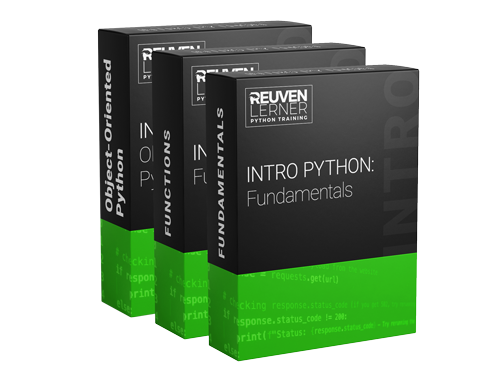
The same introduction to Python that I give at companies around the world, including basic data structures, files, functions, comprehensions, and object-oriented programming.
Git
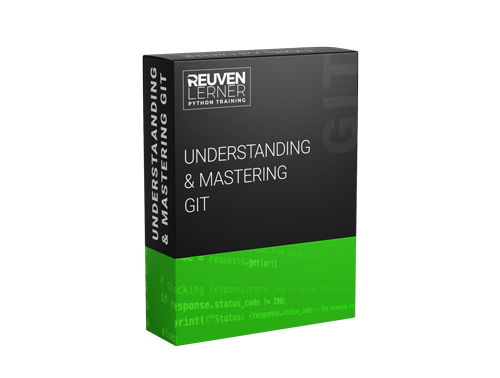
Use Git for version control, and collaboration with others via GitHub. Understand how Git works behind the scenes, and take advantage of that for branching, merging, and correcting errors.
NumPy
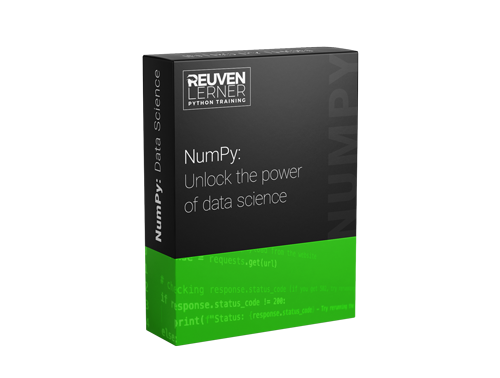
Learn how to analyze data with the ease of Python and the efficiency of C: 1- and 2-dimensional arrays, dtypes, extracting data, cleaning data, and basic plotting with Matplotlib.
Pandas
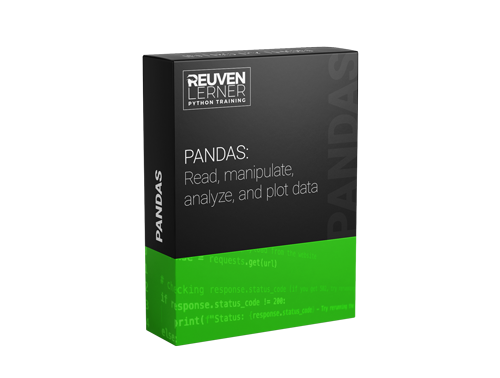
Built on top of NumPy, Pandas provides adds flexibility and built-in functionality. Learn about series, data frames, indexes and multi-indexes, analyzing data, working with text strings, working with dates, and plotting.
APPLY FOR THE BOOTCAMP
The Python Data Analysis Bootcamp is the best way I know to learn Python, Git, and Pandas in a short amount of time. I’ve taken everything I know about these technologies, and everything I know about learning, and combined them into my best, most ambitious course that I run.
But PythonDAB isn’t for everyone. Each cohort is small on purpose, allowing everyone a chance to ask questions and get the personal attention they need. It requires time, and it’s also not meant for people who are totally new to coding. It’s also my most expensive course, by far, and I want to make sure that you’re going to get value for your investment.
That’s why you cannot simply sign up for the bootcamp. Rather, I ask that you schedule a free coaching call with me. We’ll talk about your background, I’ll answer any questions you have, and we’ll see if you’re good for the bootcamp — and if the bootcamp is good for you.
Want to level up your career with Python and Pandas? Let’s talk, and see if PythonDAB is the best way for you to do it. I look forward to speaking with you!
Schedule Your Coaching Session
Just fill out this form and we will get your coaching session scheduled.
BOOTCAMP SCHEDULE
SMALL COHORTS
PREVIOUS KNOWLEDGE
INVEST IN YOUR CAREER
MAJOR COMPANIES HIRE ME TO TRAIN THEIR DEVELOPERS
I would love to train you as well
IBM
Apple
Western Digital
Cisco
Paypal
Intel
BOOTCAMP SCHEDULE
Week 1: Basics
Office hours: Launch, introductions, and installation
Fundamentals, Section 1: Introduction (55 min)
Fundamentals, Section 2: Basic data types (58 min)
Fundamentals, Section 3: Strings (83 min)
Fundamentals, Section 4: Loops (40 min)
Office hours: Exercises (basic data structures) + Q&A
Week 2: Container types
Fundamentals, Section 5: Lists (86 min)
Fundamentals, Section 6: Tuples (40 min)
Fundamentals, Section 7: Dictionaries (48 min)
Fundamentals, Section 8: Sets (29 min)
Office hours: Exercise (data structures) + Q&A
Week 3: Comprehensions and files
Comprehensions, Sections 1+2: List (66 min)
(Watch sections 3-6 on your own — not required)
Files, Section 1: Basic operations (94 min)
Files, Section 2: Writing to files (45 min)
(Watch sections 3 and 4 on your own — not required)
Office hours: Exercise (comprehensions and files) + Q&A
Week 4: Functions
Functions, Sections 1+2: Intro to functions (25 min)
Functions, Section 3: Simple parameters (66 min)
Functions, Section 4: Advanced parameters (73 min)
Functions, Section 5: Scoping (64 min)
Functions, Section 6: Advanced functions (38 min)
Office hours: Exercise (files and functions) + Q&A
Week 5: IDE + Git
Office hours: Using PyCharm
Git, Section 1: Intro to Git (36 min)
Git, Section 2: Staging and committing (37 min)
Git, Section 3: Git logs and status (37 min)
Git, Section 4: HEAD and commits (24 min)
Office hours: Exercise (Working with Git) + Q&A
Week 6: Git and GitHub
Office hours: Git and GitHub
Git, Section 5: Fixing mistakes (27 min)
Git, Section 6: Git objects (15 min)
Git, Section 7: Branches (46 min)
Git, Section 8: Merges (88 min)
(Watch section 9 on your own — not required)
Git, Section 10: Network (75 min)
Office hours: Exercise (GitHub and collaboration) + Q&A
Enjoy the week off and get ready for more learning.
Week 8: Modules and packages
Starting this week:
– We’ll encourage collaborative solving of exercises
– Exercise solutions will be shared publicly on GitHub
– Everyone should give at least two comments on others’ code
Modules, Section 1: Importing (39 min)
Modules, Section 2: Writing (48 min)
Modules, Section 3: PyPI (30 min)
(Watch sections 4, 5, 6, and 7 on your own — not required)
Office hours: Using modules and venvs with PyCharm + Q&A
Week 9: Intro objects
Objects, Sections 1+2: Intro, defining classes (79 min)
Objects, Section 3: Methods (57 min)
Objects, Section 4: Class attributes (31 min)
Objects, Section 5: Inheritance (32 min)
Optional: Sections 6 and 7
Week 10: NumPy and intro Pandas
NumPy, Sections 1+2: Introduction (60 min)
NumPy, Section 3: Indexing (39 min)
NumPy, Section 4: Data types (34 min)
NumPy, Section 5: nan (21 min)
(Watch section 6, 7, and 8 on your own — not required)
Pandas, Sections 1+2: Series (53 min)
Week 11: Pandas series
Pandas, Section 3: dtypes and NaN (39 min)
Pandas, Section 4: Advanced series (35 min)
Pandas, Section 5: Strings (36 min)
Pandas, Section 6: Plotting series (56 min)
Week 12: Data frames
Pandas, Section 7: Data frames (82 min)
Pandas, Section 8: Boolean indexes (81 min)
Pandas, Section 9: Reading/writing files (91 min)
Week 13: Analysis with Pandas
Office hours: Exercises
Pandas, Section 10: Analysis (34 min)
(Watch section 11 on your own — not required)
Office hours: Dates and times in pandas
Pandas, Section 12: Indexes and multi-indexes (34 min)
Additional exercises
Enjoy some rest and refresh your mind.
Week 15: Sorting, merging, grouping — and visualization
Pandas, Section 13: Sorting, merging, and grouping (48 min)
Pandas, Section 14: Plotting and data frames (42 min)
Additional exercises
Week 16: Pandas practice
This week, we’ll do numerous exercise with pandas. There will be
two sessions of office hours to discuss and review them.
Pandas Practice & Office Hours
PROGRAM INVESTMENT
Multiple Ways To Pay
100% Satisfaction Or Your Money Back
QUARTERLY PAYMENTS
-
All of Reuven's courses and exercises
-
Participation in 2 bootcamp cohorts
-
Collaborative projects
-
2x weekly office hours
PAY IN FULL
-
All of Reuven's courses and exercises
-
Participation in 2 bootcamp cohorts
-
Collaborative projects
-
2x weekly office hours
100% Money Back 365 Guarantee
I back all of my products with a full money-back guarantee for one year from purchase. I have some of the most powerful online training in the world and will always take care of you.
